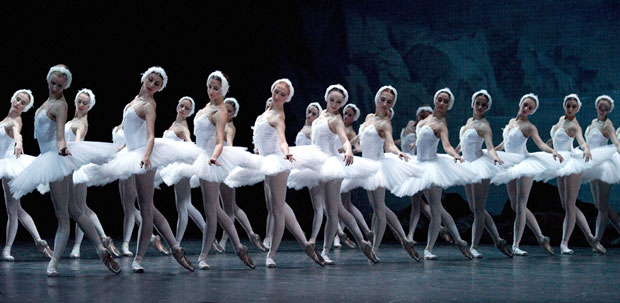
© Gene Schiavone. (Click image for larger version)
Mariinsky Ballet
Swan Lake
Zellerbach Hall, Berkeley CA
11, 12 and 13 October 2012
www.mariinsky.ru
calperformances.org
After the cast of the Mariinsky Ballet’s Swan Lake took their bows late Saturday afternoon, I thought it would be pretty straightforward writing up the compare and contrast summary of all three pairings for Odette/Odile and Siegfried I had seen. Then, the very next day, at the matinée of Bellini’s opera I Capuleti E I Montecchi (The Capulets and the Montagues) I changed my mind completely. The opera got me mulling over all the elements that make a theatrical production successful or not. And in relation to Swan Lake, I now wanted to discuss not only the dancers but include the entire narrative, the staging and the music. Bellini’s opera is not based on Shakespeare’s play and for someone who has watched dozens of ballet performances of various versions that are, I was seriously jarred out of my mental rut.
Large ballet companies coming to Zellerbach Hall on the campus of the University of California, Berkeley to perform the great classical ballets like Sleeping Beauty or Swan Lake, face a stage that isn’t big enough to hold them. When the scenery sits halfway in the wings and Odette needs to maneuver around a swan to exit, looking like an elegant lady trying to step off a crowded bus, it certainly destroys the illusion of a grand palace or a misty lakeside. I am not complaining – I just would love for these companies to dance on a stage that gives them a chance to look their very best. I am also grateful to Cal Performances for continuing to present both the Mariinsky (formerly called the Kirov at their last visit) and Bolshoi Ballets and wish they could find funding to extend the back of the theatre another 50 feet.
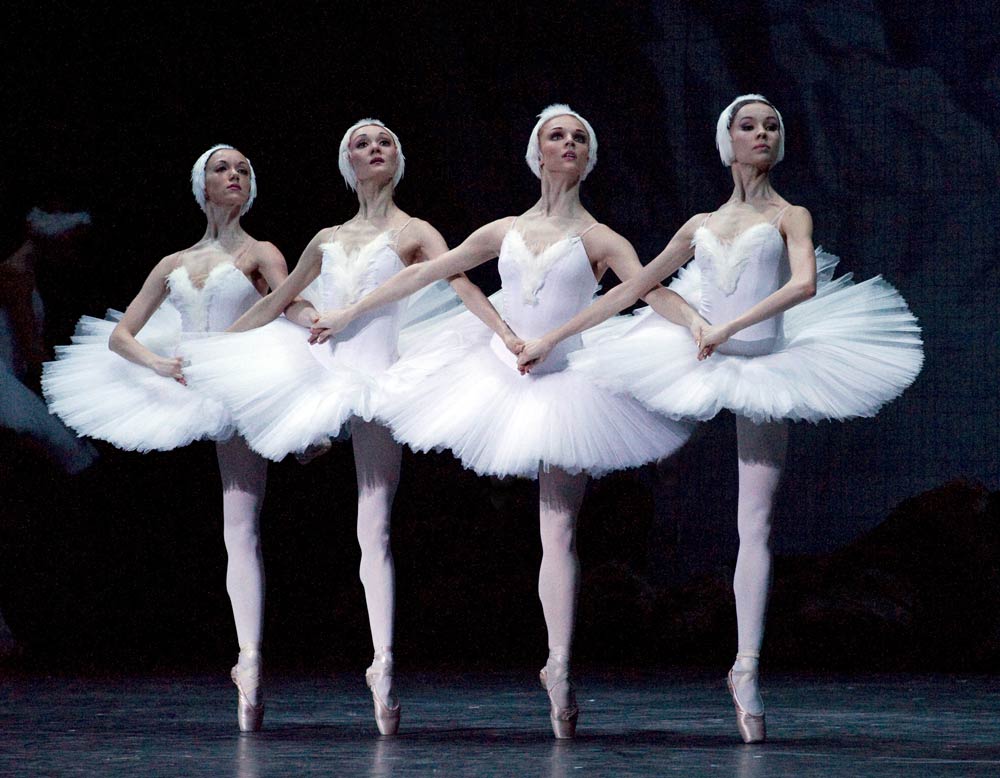
© Gene Schiavone. (Click image for larger version)
My real complaint is that the Mariinsky Ballet is still dancing the 1950 Konstantin Sergeyev version, based on the Petipa/Ivanov of 1895, stripped of most of the mime, and inserting that pesky Jester, a role that is more a distraction and only barely makes sense when danced with the utmost attention to integrating himself into the action. In truth, I am a hard-core Vladimir Bourmeister proponent. His version choreographed in 1956 for the Moscow Stanislavsky Ballet (who danced it here in San Francisco in 2003) is also performed by the Paris Opera Ballet and La Scala, and has a sweeping dramatic line and very inventive staging. Discussing the entire history of Swan Lake would make a wonderful thesis for a dance history PhD candidate, with all its incarnations by dozens of choreographers from the first production in 1877 by Julius Reisinger for the Bolshoi through to the most modern alternative ones by Mats Ek and Matthew Bourne.
That said, the company is still on top form. The corps de ballet is flawlessly unified technically, stylistically and musically down to their eyelashes. And it is to their credit that they maintain these qualities while squeezed together, wondering how to avoid running into each other.
It was very disappointing that Viktoria Tereshkina and Alina Somova were both out on maternity leave. I had been especially looking forward to seeing Tereshkina as she had won me over completely several years ago as Kitri in Don Quixote. This time around I saw three casts in the principal roles and, while I didn’t see any performances where the lead couples produced ineffable magic so beyond my expectations that they are seared into my brain, all the dancers had something to offer. The music, on the other hand, was utterly sublime.
The Mariinsky Orchestra under the baton of Mikhail Agrest is superlative and creates both the foundation and the frame for these performances of Swan Lake. Agrest’s meticulous conducting and loving interpretation of Tchaikovsky’s score is astounding. To me, despite having heard it times without number, he revealed so many new facets and explored the inner voicings in many passages. With musicians who are far superior to any ballet or opera orchestra here in the Bay Area – woodwinds and brass that make their entrances so smoothly I can stop cringing when I know they’re about to come in and strings that play with extraordinary cohesion – I could have closed my eyes for the entire performance and gone home completely satisfied.

© Gene Schiavone. (Click image for larger version)
On Thursday evening the second of the six performance in this run featured the relatively young Oksana Skoryk as Odette/Odile with Vladimir Schklyarov as Siegfried. In the first act Schklyarov is very youthful and poetic, not very self-assured and lacking the confidence of his royal position This works well as he is having trouble accepting he has become a man and is now expected to marry. The interchanges with his Tutor who replaces his goblet with a book also support his preference for thought rather than action, like a Hamlet in a new setting. Schklyarov delivers a beautifully nuanced solo before he pursues hunting the swans, though his technique isn’t as pristine as one would like. He redeems himself in Act III and dances his variations with soaring elevation, crisp beats and secure landings. In many ways Schklyarov is well paired with Skoryk – temperamentally they both lean toward a tender thoughtfulness and artistically they are searching for what defines their roles individually – but together they don’t yet have a passionate spark.
Skoryk, possessing an exceptionally pliant body as well as a luscious musicality, is very moving as the White Swan. She never arrives at the end of a port de bras and merely holds a position, instead she always reaches far beyond her fingertips and leaves delicate traces of the shape she has drawn even as she moves on to another phrase. Rumour had it that on this tour she had been unable to complete the now requisite thirty-two fouettés in the Black Swan pas de deux. Her nervousness in Act III is palpable leading up to that moment and affects her ability to create a strong Odile. But once she pulls off the grueling turns, she relaxes and has just a few more minutes to hint at what she might be capable of in the future.
Anastasia Kolegova and Yevgeny Ivanchenko danced the lead roles on Friday night. She is secure technically but offers little emotive power. Her Odette needs more vulnerability and her Odile could use more than a smile to differentiate it from her white alter ego. Ivanchenko seems almost too confident in the first act and then goes on to be rather indifferent in the third act. It would be more logical to play it the other way around – first not wanting to do his mother’s bidding and then being enthusiastic about declaring his intention to marry the woman he believes to be Odette.
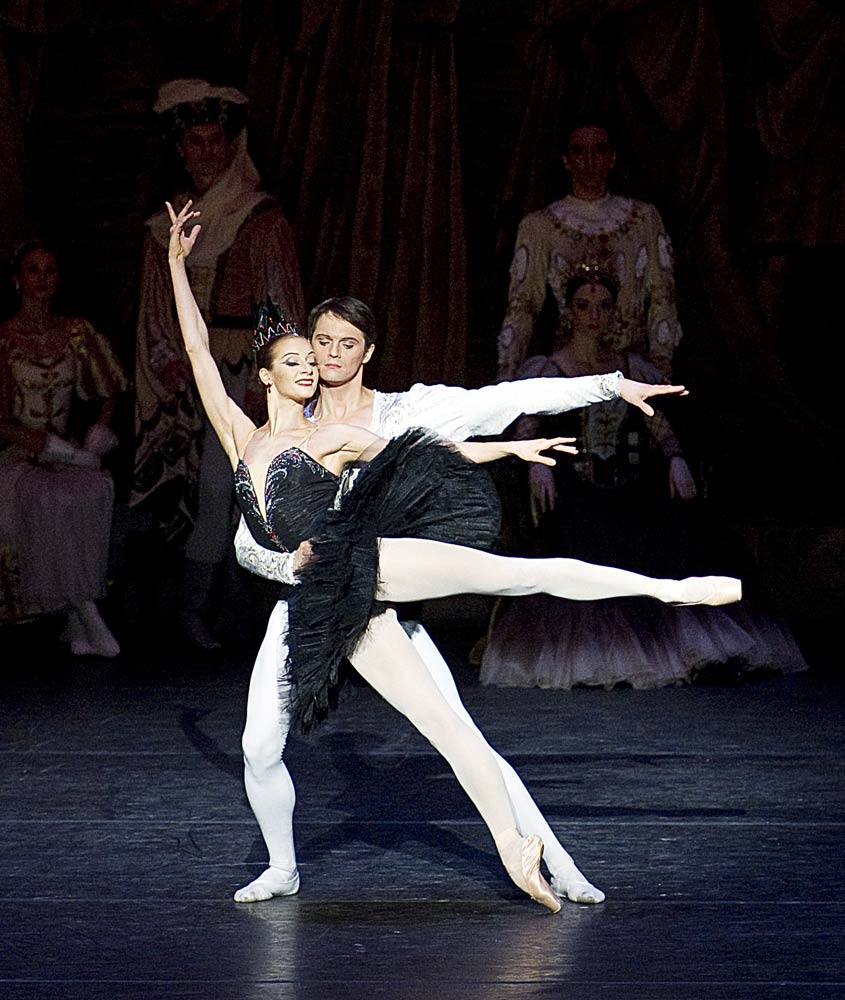
© Gene Schiavone. (Click image for larger version)
The Saturday matinée offerd the best cast all round. Ekaterina Kondaurova is elegant and regal as Odette, though more musicality would be welcome. Her transition from woman to swan, arms rippling, is simply wondrous. She puts a glittery edge on Odile’s deceptive tactics to fool Siegfried, even switching momentarily back to Odette-lke softness to be more convincing. As Siegfried, Danila Korsuntsev is such an attentive partner and polished dancer that you couldn’t ask for more.
Even in the minor roles there are some exceptional interpretations. Konstantin Zverev is the only Rothbart who truly embodies majestic evil. He fills the space with his broad movements and powerful presence while he exerts absolute control over his fiefdom of swans. Ekaterina Ivannikova, Nadezhda Botoeva, and Alexander Parish in the first act pas de trois shine. Ivannikova has especially buoyant jumps, a sparkling entrechat-six and a smile that radiates her love of dancing. Even the Jester, Ilya Petrov, improves on his previous rather dull performance, and becomes much more animated and involved with the others on stage.
It would have been nice to see more of the repertoire then this old warhorse. I do understand the difficulties of touring with large productions – all the sets and costumes – but the audience in the Bay Area is hungry to see other ballets, too, and hopefully we will in the near future.


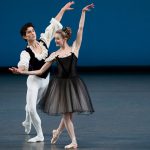
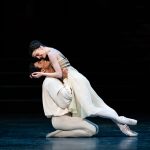
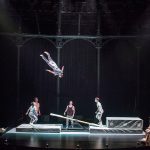

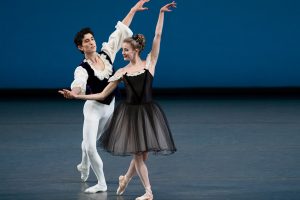
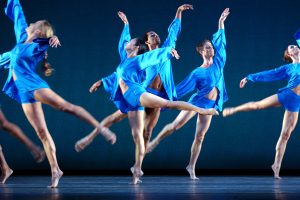

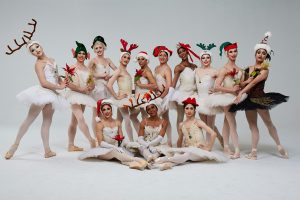

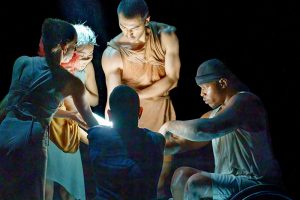

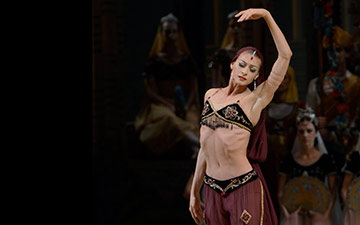
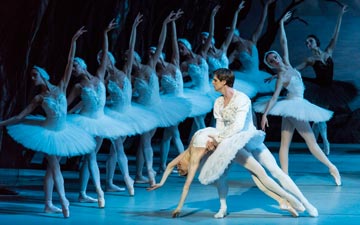
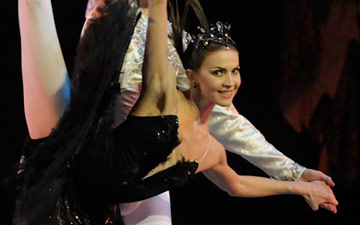

Bravo for this review.
i do ballet it was good i have done ballet for 3 year and i’m getting my pointe shoes soon.